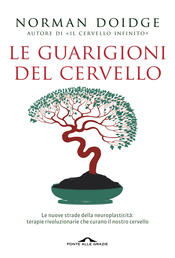

Sinossi
Cheryl ha la costante sensazione di cadere a causa di un deficit del suo apparato vestibolare; Barbara ha un cervello asimmetrico ed è considerata "ritardata"; Michael è un chirurgo oculare che a quarantaquattro anni subisce un ictus invalidante. Queste sono solo alcune delle storie alle frontiere della neuroscienza narrate in questo saggio: per loro e per molte altre tipologie di pazienti ora c’è una concreta possibilità di recupero e completa guarigione. La scoperta che ha aperto la strada a questa fondata speranza è quella della neuroplasticità, ossia la proprietà del cervello di essere malleabile sempre, non solo nell’infanzia.
La tesi che ha scatenato la rivoluzione della neuroscienza ci dice che il cervello è in grado di cambiare se stesso e può funzionalmente riorganizzare ogni sua parte per sopperire alle carenze che si vengono a creare in seguito ai traumi o al lento processo di invecchiamento. Non solo. L’intera esperienza umana può essere spiegata esplorando le potenzialità del cervello malleabile: la creatività e l’amore, la dipendenza e l’ossessione. Si tratta di processi neurologici molto complessi che sono indagati, anzi, vivacemente raccontati con semplicità e chiarezza espositiva.
"Un ritratto notevole e pieno di speranza delle infinite capacità di adattamento del cervello umano."
Oliver Sacks
"La forza del pensiero positivo guadagna finalmente credito scientifico. Emozionante, miracoloso, dirompente."
The New York Times
"Doidge è un maestro... nello spiegare la scienza a tutti noi. È la miglior guida possibile. Non serve essere un neurochirurgo per leggerlo, basta la curiosità. Comprate questo libro. Il vostro cervello vi ringrazierà."
The Globe and Mail
"Splendido. Doidge ha individuato un punto d’innovazione della scienza di base… Le implicazioni sono colossali."
The London Times
- ISBN: 8868331578
- Casa Editrice: Ponte alle Grazie
- Pagine: 416
- Data di uscita: 10-07-2014



